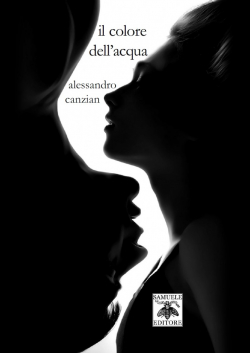Editorial
by Francesca Del Moro
Starting from Panspermia, the theory of the seeds of life, the poets selected for this issue wondered about the birth of the Universe and the possibilities of life outside planet Earth. In the poem by Paolo Polvani, the seeds are imperceptible presences singing all around us, perpetually occupied in building new worlds, the same worlds about which we usually ask a lot of trivial questions. The seeds depicted by Luca Olivieri’s vivid and enigmatic lines are silent, evoked by a diabolic mushroom which is willing to move to a new dimension. In a prophetic tone and blending mythological references and scientific terminology, Alice Diacono sums up the birth and the meaning of the Universe outside and inside us. In the poem by Rodolfo Cernilogar, which juxtaposes fragments of life as snapshots of details, seeds metaphorically represent the glimpses of other worlds that people are allowed to catch, in precarious equilibrium between the love for their motherland and the wish to move beyond. But, all in all, life itself is what matters, as Ulisse Fiolo stresses in his short poem, as he wonders about its origin an celebrates it in effective lines recalling the style of the Bible.
Seeds in the Universe
by Paolo Polvani
It floats inside a cup of tea, the idea
of the Universe, and questions run as fast as hares,
swelling with wind and stupidity: does anybody
ride a bicycle on other planets? do they sell apples
at the market? small thorns of curiosity arise
from underground cracks: and the snow? does it have the same
crystalline structure? somebody says:
are company and workers less and less opposed
in the social perception? Are there eyes
that do not look like eyes? talking rivers?
are there deities showing their genitals? runaway
Madonnas? blue canals, skies to leaf through?
The seeds sing the same songs everywhere:
they whisper, call each other, swell with intentions,
with choices, they open their mouth wide, scream,
creak, grind their teeth, break,
stick out, break ranks.
Let the son of Eubulus be pushed away from Athens
by Alice Diacono
Let the son of Eubulus be pushed away from Athens,
let the rope be laid at the bottom of the ocean,
let the stellar nucleosynthesis be banished,
because crazy are those who say that life wasn’t born from the hands of a God
or from a globular cluster exploding.
In the heavenly bodies
polycyclic aromatic molecules, porphyrin and polyformaldehyde
travel in the wake of the comets.
The seeds of life pollinate the planets,
where the land is fertile
the spores become mildew
the mildew becomes a man
and the man becomes mildew again
till everything is ready for a new start.
The soul’s cosmology is only a thermonuclear reaction of the Universe.
Listen, little man:
what you must learn
is all in the breath
that passes through yourself.
Celebrate feasts and forests
by Ulisse Fiolo
Some say he was a stranger
and by now some people assert they are aliens,
the meaning is actually the same:
we must always remember
to celebrate the forests again
and the air and all the trees of life
– the earth, the water, every flower and every fruit,
with the adagio of meadows in the dead of winter –
so that the real hearth be a earth…
[* Wayòmer Elohìym: yehìy òr! Wayehìy òr… = And Deity said: Let there be Light! And there is Light… – Bible, Genesis 1:3, translated from Hebrew by the author…]
AMANITA
by Luca Olivieri
If the seeds were everywhere,
if every corner of dust could speak,
the devils of my eyelids wouldn’t have to whisper anymore
to exhume the limbos of the middle dimension.
Sand balances
by Rita Stanzione
The light has sand balances
it carves darts
from the buried gold of leaves,
puffs of embers
support the heaven
of guardian aliens.
They pass through us, tremors
of settlement with destiny
-traces and contaminations
or it is a veil that slowly fluctuates
draining memories
of a jerk- dust
that was the soul of a star.
LIGHT YEARS
by Rodolfo Cernilogar
I wish I lived here at last.
This is space that turns into
time, sun rags hitting
the peaks, steps around a cloister,
millimetres of a pencil and calculations, pins
of light in the eyes. It’s time
that turns into space,
waves that don’t have an origin nor a shore
but only a temporary and variable
threshold
to cross…
They call them light years.
I wished I lived there again.
I think I would be weightless.
Any luggage almost useless.
My thoughts essential.
Never fully departed.
Never fully arrived.
I trust humans
their wish to go
beyond, to know the heart
of galaxies.
For now we can only live
light
hours, light
minutes
when by grace or deeds
we meet them, alone or in company.
Il colore dell'acqua
by Alessandro Canzian
Water is something we usually take for granted but we cannot do without it. It draws our attention each time it reveals its beauty or its power: when it comes in the form of a river, a lake, the sea, when it embraces us or flares up, when it gives us pleasure or threatens to kill us. Water is transparent and soon slips away, it loses it shape as it falls. In this book by Alessandro Canzian, water becomes the metaphor of the power and the meaning of the smallest and apparently meaningless details that time sweeps away. The poet wants to give water a colour, but this doesn’t imply melting some dye in it: the purpose is to capture its true colour, that only attentive eyes can see. And he also wants to capture memories, opposing, as Mario Fresa points out in the foreword, “the surfacing of nothing and of the death that at any given moment squashes and presses any event, any gestures, any word emerging”. Poetry about everyday life is scarcely an original theme but it rarely inspires neat and meaningful lines as the ones we find in this book. Being both a poet and a publisher, Alessandro Canzian makes good use of the editing work that he rightly considers as one of the flagships of his publishing house. The editing mainly consists of subtraction, with the aim of removing all that is unnecessary, in order to make the most of each word, of blank spaces, of the graphic design of the lines on the page, with the same accuracy which is needed to reveal the colour of water. Everywhere we can perceive the will to lay down and deposit each word into the reader’s mind. The blank space that in the first section alternates with ink in a well-balanced proportion and in the second and third sections prevails framing lapidary poems is no less important than writing: it marks the time for breathing, the time necessary to savour the stimulations of the five senses, to see the snapshots taken by the poet, to assimilate his thoughts and let our own reflections flow. White washes writing, purifies it and makes it clear, just like water. The line “I love minimal words” is an explicit poetic statement. A great importance is ascribed to the smallest elements, such as insects, nails, shoelaces and the sound made by heels as they step on the ground. Stories are built up lighting up fragments and surprising the reader showing him what has always been before his eyes. In the first two sections about loss, the poet addresses the woman in the second person recalling the gestures, the places, the objects that day after day have made their love and preserve it. In the last section, the lost and missed love is replaced by an imagined woman, anticipated by the initial O in the first group of poems (entitled “Histoire d’O”, where O is pronounced exactly like eau, water). “The girl Olga” is the protagonist of a consistent series of poems that explicitly pays honour to Pagliarani but outlines an absolutely original, open-ended and mysteriously disturbing story. “I imagined it was her coming back from work without having resolved anything about life”: these are the crucial lines around which the details of Olga’s life swirl – lines that also speaks about ourselves. Olga is evoked through sounds coming from upstairs, the sounds of the shower, of hair falling down on her shoulders, of the stockings she throws away, of her screams when she makes love. The silence she leaves in the end is heavy and powerful whereas her smell remains and permeates every space in the building. Like the woman of the previous sections, Olga is a presence that becomes stronger through her absence, in this case through her nonexistence, a presence that the precise and weighty words by Alessandro Canzian endow with a clear consistency and a universal meaning.

